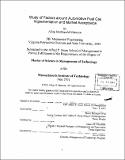Study of factors around automotive fuel cell implementation and market acceptance
Author(s)
Marcum, Allen McDonald, 1961-
DownloadFull printable version (5.147Mb)
Other Contributors
Massachusetts Institute of Technology. Management of Technology Program.
Advisor
James M. Utterback.
Terms of use
Metadata
Show full item recordAbstract
There are data that suggest that the earth's surface temperature has. increased over the past century. Many scientists believe that this rise is due to the emissions of greenhouse gases by anthropogenic sources, while others believe it is due primarily to natural phenomena, such as solar cycles. Regardless of the actual cause, we should be motivated to drastically reduce · emissions of these gases, improve fuel efficiency, and reduce other type of air pollution. This will also reduce the country's reliance on potentially unstable foreign sources of these fuels. There are many technologies currently being developed which promise to reduce our consumption of fossil fuels in automotive applications, including direct injection internal combustion engines, hybrid engines, battery-powered cars, fuel cells, 42-volt electrical systems, and lightweight bodies. When considered on total lifecycle and infrastructure bases, there can be significant downsides associated with any of these technological improvements, but each also offers a potential contribution to lowering fuel consumption. This thesis proposes that there are steps that can be taken to enhance the mainstream acceptance and benefits of these technologies, including early electrification of loads onboard vehicles, incremental reductions in consumption, and use of fleets to implement technologies requiring new infrastructure buildouts. However, automotive emissions are a small part of the overall emission problem, and we should also be concentrating efforts in other areas as well.
Description
Thesis (S.M.M.O.T.)--Massachusetts Institute of Technology, Sloan School of Management, Management of Technology Program, 2001. Includes bibliographical references (p. 78-79).
Date issued
2001Department
Management of Technology Program.; Sloan School of ManagementPublisher
Massachusetts Institute of Technology
Keywords
Management of Technology Program.